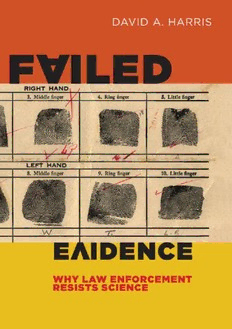
Failed Evidence: Why Law Enforcement Resists Science PDF
Preview Failed Evidence: Why Law Enforcement Resists Science
Failed Evidence This page intentionally left blank Failed Evidence Why Law Enforcement Resists Science David A. Harris a NEW YORK UNIVERSITY PRESS New York and London NEW YORK UNIVERSITY PRESS New York and London www.nyupress.org © 2012 by New York University All rights reserved References to Internet websites (URLs) were accurate at the time of writing. Neither the author nor New York University Press is responsible for URLs that may have expired or changed since the manuscript was prepared. Library of Congress Cataloging-in-Publication Data Harris, David A., 1957- Failed evidence : why law enforcement resists science / David A. Harris. p. cm. Includes bibliographical references and index. ISBN 978-0-8147-9055-7 (cl : alk. paper) ISBN 978-0-8147-9056-4 (ebook) ISBN 978-0-8147-4466-6 (ebook) 1. Criminal justice, Administration of—United States. 2. Law enforcement—United States. 3. Science—United States. I. Title. HV9950.H396 2012 363.250973—dc23 2012010674 New York University Press books are printed on acid-free paper, and their binding materials are chosen for strength and durability. We strive to use environmentally responsible suppliers and materials to the greatest extent possible in publishing our books. Manufactured in the United States of America 10 9 8 7 6 5 4 3 2 1 To my parents mary and ruben harris two extraordinary people who gave me everything I needed to become what I am. This page intentionally left blank Contents Acknowledgments ix 1. Introduction: Science-Driven Policing, or Police Indifference to Science? 1 2. Science and Traditional Police Investigative Methods: A Lot We Thought We Knew Was Wrong 18 3. In Their Own Words: Why Police and Prosecutors Say They Resist Science 57 4. The Real Reasons for Resistance: Cognitive Barriers 78 5. The Real Reasons for Resistance: Institutional and Political Barriers 99 6. What Must Be Done and How to Make It Happen 128 7. Reasons for Hope: Examples of Real Change 169 8. Conclusion: From the Task to the Solutions 191 Notes 197 Index 251 About the Author 260 >> vii This page intentionally left blank Acknowledgments Understanding the issues discussed in this book presented a great challenge, and I could not have managed to find my way into the many layers that sur- round this subject without the help of those individuals who were willing to talk with me and share their experiences, knowledge, and wisdom. They included present and former prosecutors, police officers, defense lawyers, scientists, forensics experts, and judges. I am especially grateful to those peo- ple from the law enforcement community who spoke to me; their contribu- tions were fundamental to my understanding. Some of the people I spoke with appear in this book; others do not. But all of them should know that their willingness to speak candidly with me was incredibly valuable. Thank you, one and all. There is a widespread misconception about writing a book. The common image of the writer is the lone man or woman working for hours on end in solitude, putting the words down, editing them, and producing a finished product that might get published some day. There is some truth to this quaint image, but it captures only one part of the endeavor. There is so much more to a book than the author writing it; anyone who has done it knows that it takes a whole team. Pitt Law’s helpful and sharp library staff was always game for the challenge of finding the obscure sources I needed. Pitt Law’s Docu- ment Technology Center staff went above and beyond the call of duty many times to get my manuscript in shape. Research Assistant Emily Boardman (Pitt Law Class of 2012) and Library Fellow Derek Candela (Pitt Law Class of 2011) both did a great job helping me assemble basic research materials. My colleagues at Pitt were always willing to listen to me and make sugges- tions as I formed the ideas that found their way into this book. As always, my ace in the hole has been my secretary, Patty Blake, who has saved me from more errors than I can count. Most of all, I thank Professor Andrew Taslitz of American University Washington School of Law and Deborah Gershenow- itz, my editor at NYU Press. Both of them believed in this project from the very beginning, and helped me understand the book I needed to write, as opposed to the one I started with. Both Andy and Debbie helped me through >> ix
